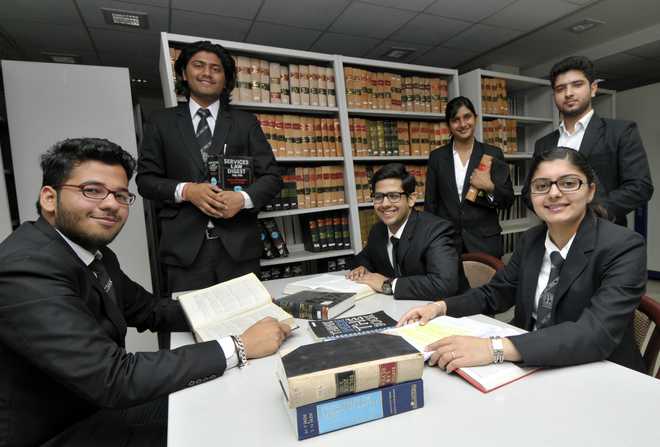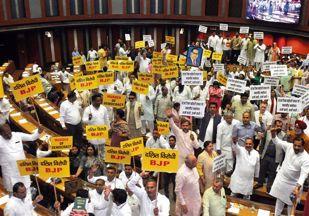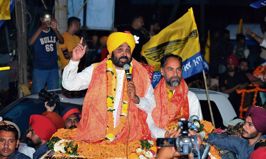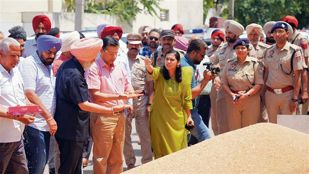
For the love of law: The demand for qualified legal professionals is soaring in the country, making this profession a lucrative bet for youngsters
Nishtha Jaswal
The economy of the world has evolved with globalisation, privatisation and liberalisation and geographical boundaries between the nations are disappearing for many purposes. The whole world has become a shrunken village, Friedman rightly titled his book “The World is Flat”. Multinational corporations started moving from one nation to another in search of better business opportunities. The growing footprint of the internet and communication technology has redefined the rules of trade and commerce has changed. All these developments, interalia, provided fertile ground for the growth of Law as a profession in the first decade of the 21st Century.
Law as a profession was considered to be a “losers’ choice” for long in India. After Independence and till 1960s it was only a two-year degree course after graduation. Later in 1970s it was made a three-year course after graduation, but for most of the time it failed to attract brilliant students, despite a growing demand for law graduates in almost all the fields.
Schools of excellence
It was in 1986 that National Law School was established at Bangalore with the aim to provide quality education in this field. This university that became functional in 1988 offered five-year integrated BALL.B. degree programme in India for the first time and the students were admitted after Plus II. This was followed by NALSAR, Hyderabad, in 1998. Today we have 18 law universities, each established by an Act of the state legislature, in different parts of the country for training law graduates.
The admission to the 16 law universities is through the Common Law Admission Test (CLAT), which is conducted by rotation by one of the universities. This year it is being conducted by Dr. Ram Manohar Lohia National Law University, Lucknow (RMLNLU). This year the online CLAT will be held on May 10, 2015. Next year it will be conducted by Rajiv Gandhi National University of Law (RGNUL), Patiala. In other universities which are concerned by CLAT are: National Law School of India University, Bangalore (NLSIU); National Academy of Legal Studies & Research (NALSAR) University of Law, Hyderabad; National Law Institute University, Bhopal (NLIU); West Bengal National University of Juridical Sciences, Kolkata (WBNUJS); National Law University, Jodhpur (NLUJ); Hidayatullah National Law University, Raipur (HNLU); Gujarat National Law University, Gandhinagar (GNLU); Chanakya National Law University, Patna (CNLU); National University of Advanced Legal Studies, Kochi (NUALS); National Law University Odisha, Cuttack (NLUO); National Law University of Study & Research in Law, Ranchi (NUSRL); National Law University & Judicial Academy, Assam, Guwahati (NLUJAA); Damodaram Sanjivayya National Law University, Visakhapatnam (DSNLU) and The Tamil Nadu National Law School, Tiruchirappalli (TNNLS). Today, these universities are the most sought after, and getting admission is tough.
The success story of these universities is because of their focused approach and minimum role of politics. Most of the Vice-Chancellors are eminent academicians in the field, who understand the needs of students in a fast-changing world. These law universities are also very closely associated with the Bar and Bench as many eminent lawyers, including some officials of the Bar Council and Judges of High Courts, are on their governing bodies and in most of the cases their Chancellor is either the Chief Justice of the respective High Court or the Chief Justice of India. Thus, these institutions are guided by eminent legal luminaries, have good faculty and greater autonomy.
The private take
In addition of these universities, the five-year integrated BALLB degree course is also offered by many private as well as in traditional universities. Among the private players, Army Institute of Law, (AIL), Mohali (Punjab), the Symbiosis Law School, Pune, Amity Law University, Delhi and Jindal Global Law School, Sonepat have been attracting a number of students. These universities have also been able to maintain a high academic standard and focus on modern pedagogy for teaching law. In all these universities a lot of emphasis is being laid on practical training by way of compulsory internship with lawyers, High Court and Supreme Court judges, law firms, tribunal/commissions and NGOs etc.
Mooting experience
Students of the five-year integrated degree course are given specialised training of mooting. The students of these universities have been participating in the International Moots held in Washington D.C., Florida, Singapore, and many other places outside India. This mooting skill not only provides confidence to the students, but also trains them professionally for preparing cases and searching legal material. Students of integrated law course can get into specialised streams of their choice and this way they save one year by completing the integrated course.
Apart from the five-year integrated course, students also have the option of getting into the three-year degree course being offered in most of the traditional universities. Students opting for this course have an advantage of being mature enough to understand the nuances of law in a better way.
Vast choice
A fresh law graduate has lots of opportunities to choose his career. He can specialise in any of the growing branches of law and decide about his career. He can also join the legal profession to become a lawyer and be a master of his own profession. Remember, there is no retirement age for those in the legal profession. Some fresh law graduates prefer to join the subordinate judiciary by appearing in the state level test. They can join JAG (Judge Advocate General) branch in Indian Army as a direct Commissioned Officer. They can join as law officers in various multinational corporations or other organisations or companies. They may choose to study further to do PG and join teaching. Thus, for law graduates, the market is full of opportunities and they can choose the career of their choice.
—The writer is Professor, Department of Laws, Panjab University, Chandigarh
Top Law colleges
National Law University, Delhi
www.nludelhi.ac.in
Seats: 80
USP: The university also offers short-term diploma courses in Competition Policy and Law, environment law, etc.
University Institute of Legal Studies, Panjab University, Chandigarh
uils.puchd.ac.in
Seats: 150
USP: Focus on honing 'DRAIN' — Drafting, Research, Advocacy, Interviewing and Negotiation skills of the students.
Army Institute of Law, Mohali
www.armyinstituteoflaw.org
Seats: 80
USP: Established under the aegis of Army Welfare Education Society (AWES) it offers five-year integrated BA LLB (Hons) .
Rajiv Gandhi National University of Law, Patiala
www.rgnupatiala.org
Seats: 80
USP: Five-year integrated bachelor’s course with extensive and intensive classroom instruction and participative learning atmosphere.
Jindal Global Law School, Sonepat
www.jgis.org
Seats: 180
USP: It is a non-profit university established by the Haryana Private Universities (Second Amendment). Offers specialisation in three streams. Foreign collaborations are a highlight of this institute.
College Of Legal Studies (CoES), UPES, Dehradun
www.upes.ac.in/college-of-legal-studies
USP: Only institute in South Asian region to offer specialised courses like BALLB with specialisation in Energy Laws, BBA LLB (Hons) Corporate Law and B.Com + LLB with specialisation in Taxation Laws and BTech Energy Technology + LLB with specialisation in Intellectual Property Rights and BTech Computer Science & Engineering with specialisation in Cyber Laws.
School of Legal Studies Guru Nanak Dev University, Jalandhar
www.gndu.ac.in
USP: Started in 2002 it is approved by Bar Council of India. School of Legal Studies offers five-year BA LLB course.
(Based on selected lists from India Today, Outlook and other national surveys)
Emerging fields
With the emergence of air and space law, cyber law, sports law, information technology, cloud computing, privacy issues and new dimensions of human rights, the scope of law courses has expanded. Some specialised courses are:
Alternate Dispute Resolution (ADR)
Given that the cost of litigation is normally high, every judicial system has provided some other means of dispute resolution in the form of Alternative Dispute Resolution (ADR) that seek to minimise the costs of dispute resolution by avoiding expensive court costs. The most common forms of ADR are conciliation, mediation and arbitration. Arbitration is a legal process which results in the arbitrator(s), instead of a court judge, issuing an award to the aggrieved party. An arbitration award has a status similar to that of a court judgment and is enforceable in a similar manner. Arbitration is a binding form of dispute resolution, equivalent to litigation in the courts, and is entirely distinct from the various forms of non-binding dispute resolution such as negotiation, mediation, or non-binding determinations by experts. Arbitration also covers the tools of mediation and conciliation where the disputing parties try to solve their differences by mutual consent. These days there is a great demand for arbitrators across the world.
Sports law
According to the traditional view sports law represents nothing more than an amalgamation of various substantive areas of the law which are relevant in the sports context. In fact, sports law encompasses a multitude areas of law brought together in unique ways. Issues such as antitrust, contracts, and torts are quite common. Sports law can be roughly divided into the areas of amateur, professional, and international sports. It covers law of contract (Club agreements, individual sports contract, management contracts, national and international cross border issues related to national and international sports events), tort law (specially related to damages and specific performance); criminal law and employment law. There are many international bodies such as Courts of Arbitration for Sports (CAS), International Olympic Committee (IOC), International Federation (IF), World Anti-doping Agency (WADA) etc that play the role of regulator of sports law as well as a source to solve disputes through sports arbitration.
Intellectual property rights (IPR)
Intellectual property is the product of the human intellect including creativity, concepts, inventions, industrial models, trademarks, songs, literature, symbols, names, brands,....etc. IPR refers to the legal rights granted with the aim of protecting the creations of the intellect. These rights include Industrial Property Rights (e.g. patents, industrial designs and trademarks) and Copyright (right of the author or creator) and Related Rights (rights of the performers, producers and broadcasting organisations). Intellectual property rights do not differ from other property rights. They allow their owner to completely benefit from his/her product. These also entitle him/her to prevent others from using, dealing or tampering with his/her product without prior permission. The owner can, in fact, legally sue and force the violators to stop and seek compensation for any damages. There are many organisations that work at national and international level to protect the intellectual property rights. World Intellectual Property Organization (WIPO) is the one to lead to regulate various related issues.



























